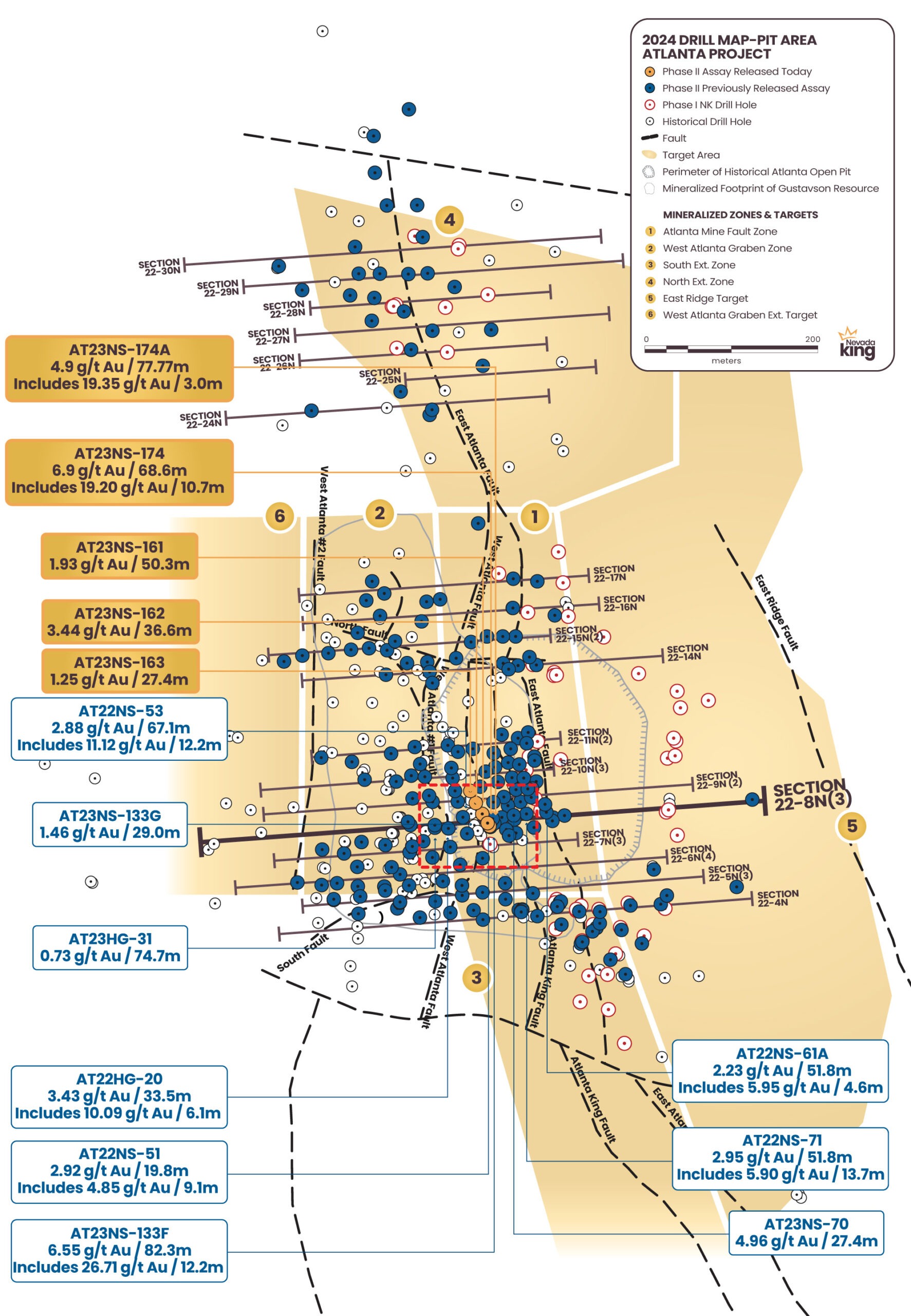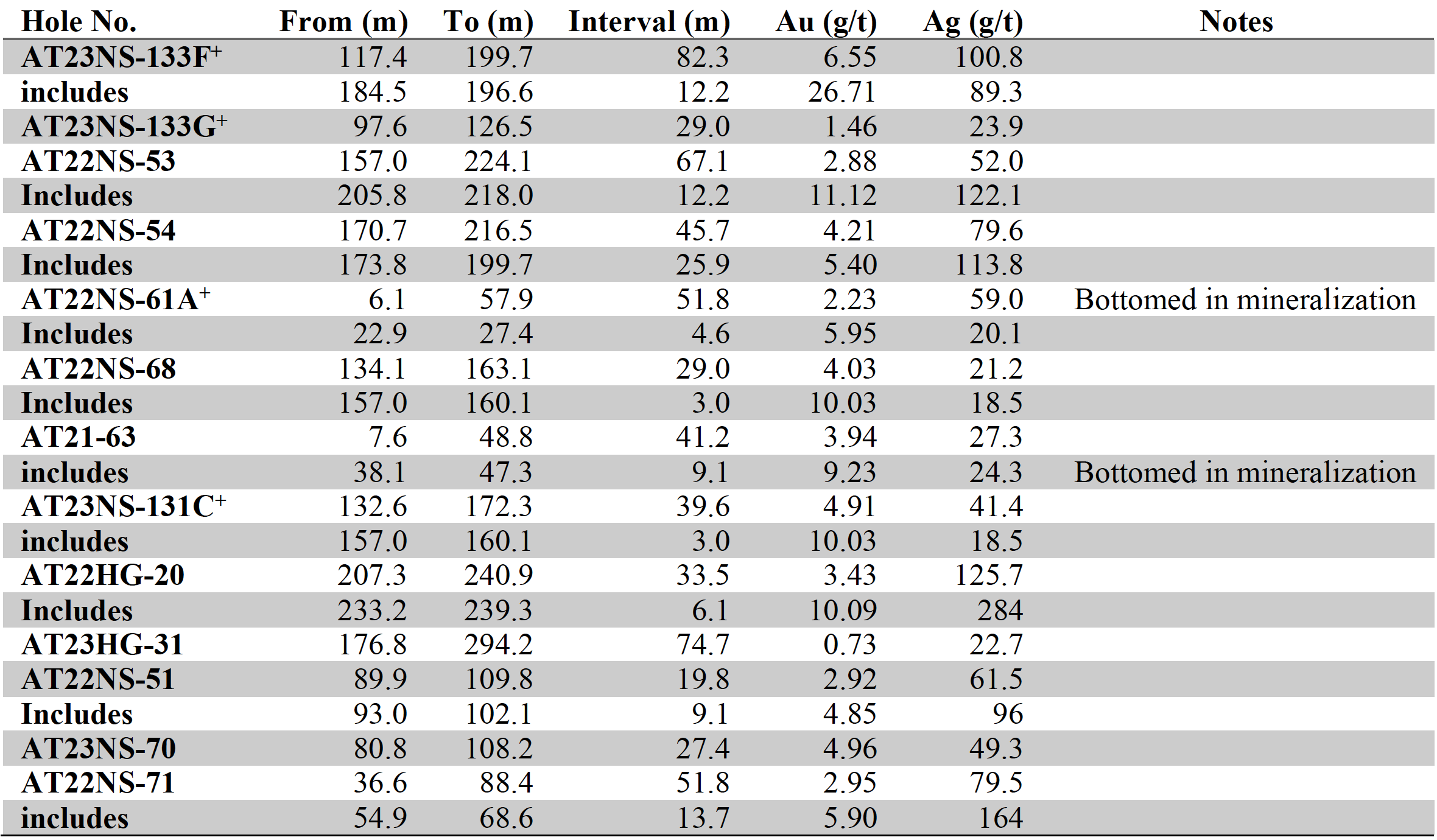VANCOUVER, BC, February 6, 2024 – Nevada King Gold Corp. (TSX-V: NKG; OTCQX: NKGFF) (“Nevada King” or the “Company”) is pleased to announce assay results from five reverse circulation (“RC”) holes located along an updated Section 22-8N(3), initially released February 1, 2023 and updated October 30, 2023, that were recently completed at its Atlanta Gold Mine Project located 264km northeast of Las Vegas, Nevada, in the prolific Battle Mountain Trend.
Highlights:

- Two of today’s holes were angle holes that were sited to follow up on the very high-grade intercept of 6.55 g/t Au and 100.8 g/t Ag over 82.3m, including 26.71 g/t Au over 12.2m encountered in angle hole AT23NS-133F, which represents the third most gold rich intercept so far recorded at Atlanta (released November 14, 2023). Today’s two follow up holes succesfully crossed the same high-grade structure, intercepting 6.9 g/t Au and 93.7 g/t Ag over 68.6m including 19.2 g/t Au over 10.7m in AT23NS-174 and 4.9 g/t Au and 75.0 g/t Ag over 77.7m including 19.35 g/t Au over 3.0m in AT23NS-174A.
- Collectively, these three steeply dipping angle holes define a high-angle west-dipping high-grade vein-like structure hosted within the hanging wall of the West Atlanta Fault (Figure 2). High grade (>5 g/t Au) mineralization occurs within a hydrothermal breccia zone 5m to 8m thick that cuts up through a 50m-wide rhyolite to quartz latite composition dike sandwiched between the West Atlanta and West Atlanta #1 Faults. Very high-grade mineralization (>20 g/t Au) is concentrated along the contact between the breccia and intrusive within a boiling zone that coincides with a sharp upward inflection in the contact’s dip.
- There appears to be about 30m of vertical extent to this very high-grade zone that is characterized by a very vuggy, strongly silicified heterolithic breccia infilled by iron oxides, clay, and barite. Lower grade mineralization spreads out laterally from the high-grade feeder zone into adjacent dike and felsic tuff hosts, as indicated by intercepts plotted around this high-grade zone (see Figure 3). We also see the high-grade zone flattening westward in Figure 2 where it was encountered in previously released holes AT23NS-53 (11.12 g/t Au over 12.2m, released February 1, 2023) and AT22HG-20 (10.09 g/t Au over 6.1m, released February 1, 2023). This high-grade “tail” that flattens at depth away from the very high-grade zone is seen in numerous holes throughout the Atlanta deposit and may be the best guide for vectoring into additional concentrations of high-grade mineralization.
- For the first time, Nevada King now has direct confirmation of a high-angle feeder structure, which in itself strongly supports the Company’s new geological model for the mineralization at Atlanta. In terms of size, shape, and depth, the Company will now use this new understanding of high-angle, high-grade feeders to more confidently pursue potential high-grade zones hosted elsewhere throughout the deposit, looking for combinations of high-grade intercepts most likely to vector into discreet areas where close-spaced drilling may encounter and define additional high-grade bodies possessing potential for significantly upgrading these various portions of the resource zone.
- As shown on Figure 3, two other prospective feeder zones are outlined in blue to the southeast and east of AT23NS-174. Angle hole AT23NS-131C (4.91 g/t Au over 39.6m, released January 9, 2024) and vertical hole AT22NS-68 (4.03 g/t Au over 29m including 10.03 g/t Au over 3m, released January 6, 2023) are considerably higher grade than the surrounding holes, so we now suspect there is another feeder structure in close proximity to these holes. In similar manner, vertical hole AT21-63 (3.95 g/t Au over 41.2m includes 9.23 g/t Au over 9.1m, released January 20, 2022) and angle hole AT22NS-61A (2.23 g/t Au over 51.8m includes 5.95 g/t Au over 4.6m near top of intercept, released October 18, 2022) also exhibit evidence of proximity to a high-grade feeder along the East Atlanta Fault.
- The three vertical holes released today tested and successfully filled in gaps in the current drill pattern along the footwall side of the WAF (Figure 1) and intercepted 1.93 g/t Au over 50.3m, 3.44 g/t Au over 36.6m, and 1.25 g/t Au over 27.4.
Cal Herron, Exploration Manager of Nevada King, stated, “We chose to further pursue the high-grade intercept in AT23NS-133F largely because we could fan-drill the probable strike line with a series of shallow, steep angle holes from a single drill platform. So far, we’ve proven that the high-grade mineralization can be tracked along strike, which will enable a resource modeler to tie the high-grade intercepts together into a cohesive body. Just as important, we also now see what a high-grade feeder zone at Atlanta looks like and how it relates geologically to the surrounding rocks and structures. The whole point of drill-defining these high-grade structures is to further up-grade the resource, both in scale and confidence. The AT23NS-133F high-grade zone may be too narrow to appreciably upgrade the surrounding area, unless additional definition drilling can connect the higher grade mineralization (>5 g/t Au) eastward to the West Atlanta Fault, as seen in Figure 3 above. However, the larger areas northwest and southwest of the pit along lines 22-3N through 22-7N and 22-14N through 22-18N host considerably more potential for increasing overall grade. In both areas there is good evidence for multiple feeder zones, such as hole AT23WS-44 (11.64 g/t Au over 108.2m including 37.16 g/t Au over 29m). Going forward, Nevada King is now re-evaluating its drill intercepts within both areas and choosing discreet targets to selectively test.”




QA/QC Protocols
All RC samples from the Atlanta Project are split at the drill site and placed in cloth and plastic bags utilizing a nominal 2kg sample weight. CRF standards, blanks, and duplicates are inserted into the sample stream on-site on a one-in-twenty sample basis, meaning all three inserts are included in each 20-sample group. Samples are shipped by a local contractor in large sample shipping crates directly to American Assay Lab in Reno, Nevada, with full custody being maintained at all times. At American Assay Lab, samples were weighted then crushed to 75% passing 2mm and pulverized to 85% passing 75 microns in order to produce a 300g pulverized split. Prepared samples are initially run using a four acid + boric acid digestion process and conventional mutli-element ICP-OES analysis. Gold assays are initially run using 30-gram samples by lead fire assay with an OES finish to a 0.003 ppm detection limit, with samples greater than 10 ppm finished gravimetrically. Every sample is also run through a cyanide leach for gold with an ICP-OES finish. The QA/QC procedure involves regular submission of Certified Analytical Standards and property-specific duplicates.
Qualified Person
The scientific and technical information in this news release has been reviewed and approved by Calvin R. Herron, P.Geo., who is a Qualified Person as defined by National Instrument 43-101 (“NI 43-101”).
About Nevada King Gold Corp.
Nevada King is the third largest mineral claim holder in the State of Nevada, behind Nevada Gold Mines (Barrick/Newmont) and Kinross Gold. Starting in 2016 the Company has staked large project areas hosting significant historical exploration work along the Battle Mountain trend located close to current or former producing gold mines. These project areas were initially targeted based on their potential for hosting multi-million-ounce gold deposits and were subsequently staked following a detailed geological evaluation. District-scale projects in Nevada King’s portfolio include (1) the 100% owned Atlanta Mine, located 100km southeast of Ely, (2) the Lewis and Horse Mountain-Mill Creek projects, both located between Nevada Gold Mines’ large Phoenix and Pipeline mines, and (3) the Iron Point project, located 35km east of Winnemucca, Nevada.
The Atlanta Mine is a historical gold-silver producer with a NI 43-101 compliant pit-constrained resource of 460,000 oz Au in the measured and indicated category (11.0M tonnes at 1.3 g/t) plus an inferred resource of 142,000 oz Au (5.3M tonnes at 0.83 g/t). See the NI 43-101 Technical Report on Resources titled “Atlanta Property, Lincoln County, NV” with an effective date of October 6, 2020, and a report date of December 22, 2020, as prepared by Gustavson Associates and filed under the Company’s profile on SEDAR+ (www.sedarplus.ca).
Please see the Company’s website at www.nevadaking.ca.
For more information, contact Collin Kettell at collin@nevadaking.ca or (845) 535-1486.
Neither the TSX Venture Exchange nor its Regulation Services Provider (as that term is defined in the policies of the TSX Venture Exchange) accepts responsibility for the adequacy or accuracy of this release.
Cautionary Statements Regarding Forward Looking Information
This news release contains certain “forward-looking information” and “forward-looking statements” (collectively “forward-looking statements”) within the meaning of applicable securities legislation. All statements, other than statements of historical fact, included herein, without limitation, statements relating the future operations and activities of Nevada King, are forward-looking statements. Forward-looking statements are frequently, but not always, identified by words such as “expects”, “anticipates”, “believes”, “intends”, “estimates”, “potential”, “possible”, and similar expressions, or statements that events, conditions, or results “will”, “may”, “could”, or “should” occur or be achieved. Forward-looking statements in this news release relate to, among other things, the Company’s exploration plans and the Company’s ability to potentially expand mineral resources and the impact thereon. There can be no assurance that such statements will prove to be accurate, and actual results and future events could differ materially from those anticipated in such statements. Forward-looking statements reflect the beliefs, opinions and projections on the date the statements are made and are based upon a number of assumptions and estimates that, while considered reasonable by Nevada King, are inherently subject to significant business, economic, competitive, political and social uncertainties and contingencies. Many factors, both known and unknown, could cause actual results, performance or achievements to be materially different from the results, performance or achievements that are or may be expressed or implied by such forward-looking statements and the parties have made assumptions and estimates based on or related to many of these factors. Such factors include, without limitation, the ability to complete proposed exploration work, the results of exploration, continued availability of capital, and changes in general economic, market and business conditions. Readers should not place undue reliance on the forward-looking statements and information contained in this news release concerning these items. Nevada King does not assume any obligation to update the forward-looking statements of beliefs, opinions, projections, or other factors, should they change, except as required by applicable securities laws.

